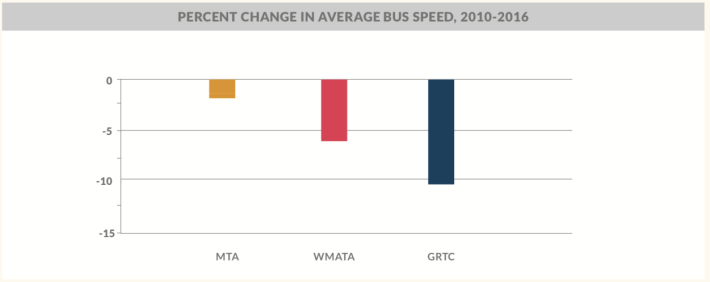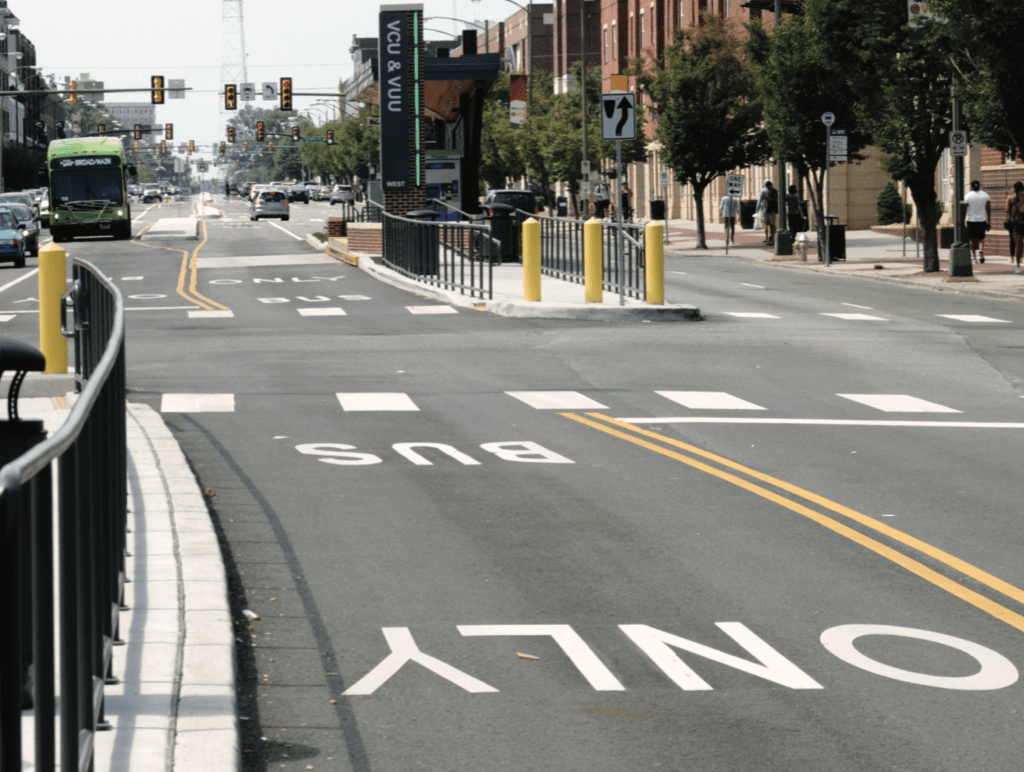Washington-area transit agencies must stop treating bus riders as second-class citizens by fixing their poor on-time performance and adding to the region's minuscule network of dedicated bus lanes — or else the region could slip into an economic decline, a new report argues.
Bus ridership in the region has declined about 8 percent since 2010, partly due to poor service, according to a new report [PDF] from the Greater Washington Partnership, a chamber of commerce of sorts for the Baltimore, Washington and Richmond region.
"Riding the bus should be easy and convenient and the experience should be comfortable, safe, and modern," the report argues. "Capital Region consumers should be able to count on buses to take them where they need to go, not leave them waiting at the stop. Buses should be treated as a valued part of the transportation system and empowered to effectively serve the needs of consumers in the region."
The group argues that none of the area's three transit agencies — Washington Metro Area Transit Authority, the Greater Richmond Transit Company and Baltimore's Maryland Transit Administration — takes responsibility for fixing problems.
As a result, the entire region has just 12.5 miles of dedicated bus lanes — with just three in greater D.C. By comparison, New York City has 82 and Los Angeles has 35. Washington's buses average just 10 miles per hour, with on-time performance at just 79 percent.

"We can no longer afford the status quo," the report adds, addressing elected officials directly. "Elected officials of this region [must] rethink our bus systems to better serve our growing region’s needs. Every tool in the toolbox is within your control. You are the owners of the region’s roads. You provide funding that sets the outcomes for the region’s public transportation systems. You can make this happen."
Without improvements, the region will not be able to reach its "economic potential," the report added.
"Poor service does little to combat traffic congestion, which costs people both time and money. Unreliable public transportation makes it harder for workers to find jobs and for the region’s employers to recruit talent. This in turn undermines the region’s ability to attract new and expanded businesses."
The group identified five priorities:
#1. A complete overhaul of the bus systems
An overhaul would help create more direct routes, eliminating branching and detours that make bus routes harder to understand and service slower. The planning process and top-to-bottom rethinking of the bus system could also help ensure bus stops aren't spaced too close together, a design failure that slows down trips.
Baltimore and Richmond have already completed partial systematic upgrades, and Washington has started exploring this idea, the Washington Post reported. Bold moves are needed, the report says.
#2. Create bus lanes
Despite 900,000 daily bus trips by area riders, the greater D.C.-Baltimore region is pitifully devoid of any dedicated space for buses.
Washington D.C.'s metro area currently has only 3.2 miles of dedicated bus lanes — 1.6 miles each way, says GWP. Baltimore has 6 miles, and Richmond has 3.5 miles, as part of its Pulse Bus Rapid Transit. That means bus riders, who help reduce congestion by crowding into a single vehicle, get stuck behind the hoards of commuters who choose to drive alone in a car instead.
The cities can also help speed up bus journeys by adding transit signal priority, to give buses a jump on car traffic at intersections. Currently there are almost 200 traffic lights with bus signal priority in the District. But Baltimore is lacking, the report states.
Bus bulbs and bus islands that extend the bus stop into the travel lane, can also speed up service and are sorely lacking.
#3. Speed up boarding
To speed service, agencies should speed payment by creating off-board fare collection — and then allow riders to enter through any door on the bus. It can shave as much as 10 percent off trip times.
WMATA does not offer all-door boarding or off-board fare payment on any bus. Richmond's Pulse bus rapid transit does.
#4. Make buses easier to use
The Greater Washington Partnership says more attention is needed to increasing accessibility and walkability around bus stops in D.C. and beyond. In addition, WMATA can reduce safety concerns by installing cameras in buses. Finally, WMATA should simplify its fare policy by offering free transfers in all cases, like New York City's MTA, GWP suggests.
#5. Measure and report bus performance
Lastly, it's important for Washington, Baltimore and Richmond to track the performance of their bus systems. How often are buses on time? How fast are they moving? The transit agencies should publish performance reports to offer a transparent statement of accountability to the public. In addition, GWP says, they should make data available to third parties, for analysis, apps.
Currently, it does not — as Transit Center found.






